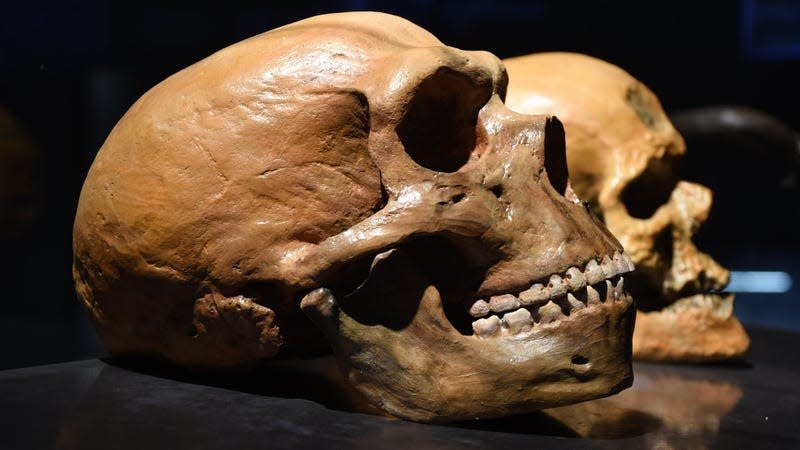Neanderthal Genes Could Explain Why Some of Us Are Morning People

A Neanderthal skull next to a modern human one.
If you’re irritated by the morning people in your life, you might have Neanderthals to blame for their existence, at least a little bit. New research suggests that our hominin relatives possessed genetic variations that predisposed them to waking up early and that they passed on these genes to our Homo sapiens ancestors through interbreeding. The study also found evidence that some people today still carry that genetic legacy with them.
Neanderthals (Homo neanderthalensis) are thought to be our closest extinct human relatives. Their lineage split away from the family tree branch that eventually gave rise to modern-day humans somewhere between 300,000 and 700,000 years ago (modern humans themselves emerged about 300,000 years ago). But they and other human species lived at the same time as our direct ancestors, with Neanderthals only dying out about 40,000 years ago. For most of their existence, Neanderthals lived in parts of what we now call Europe and Asia.
Read more
To test their hypothesis, they first identified hundreds of potential genetic variations that could potentially affect circadian rhythm in both our direct human ancestors and Neanderthals. Then they used artificial intelligence to track down genetic variants that would likely result in clearly different body clocks for the two species. This finding also meant that it was possible for Neanderthals to transfer some of their circadian-related variants over to modern humans.
Next, the team scoured through data from the UK Biobank, a long-running research project that has collected genomes from hundreds of thousands of people, looking for variants thought to have originated from Neanderthals. Many of these variants were not only tied to people’s circadian rhythms but specifically associated with being an early bird.
“By combining ancient DNA, large-scale genetic studies in modern humans, and artificial intelligence, we discovered substantial genetic differences in the circadian systems of Neanderthals and modern humans,” said lead author John Capra, an epidemiologist at the University of California, San Francisco, in a statement from the journal’s publisher. “Then by analyzing the bits of Neanderthal DNA that remain in modern human genomes we discovered a striking trend: many of them have effects on the control of circadian genes in modern humans and these effects are predominantly in a consistent direction of increasing propensity to be a morning person.”
While Neanderthals may have helped make some people early risers, the study authors say there’s much left unknown about this influence. They now plan to run similar studies on other, more diverse populations of humans and test in the lab exactly how these Neanderthal genes could affect our morningness. They’d also like to look for other common traits shaped by our gone-but-not-forgotten human cousins.
More from Gizmodo
These Car Settings Have No Business Being Controlled Through A Touchscreen
At $55,000, Is This 1977 Porsche 911 Gemballa Worth The Gamble?
Sign up for Gizmodo's Newsletter. For the latest news, Facebook, Twitter and Instagram.

